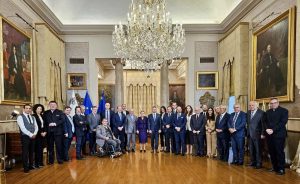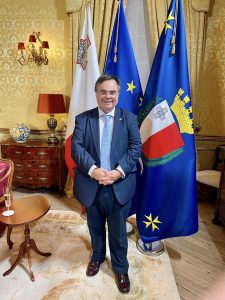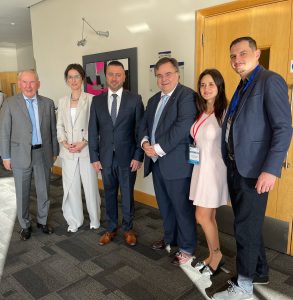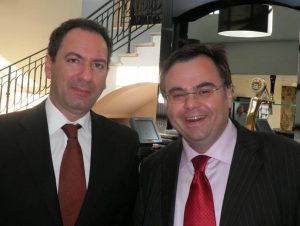Professor Dimitrios Buhalis Chaired THE MEDITERRANEAN TOURISM KNOWLEDGE EXCHANGE & POLICY CONFERENCE https://mediterraneantourismresearch.com/ followed by the 9th Mediterranean Tourism Forum https://mediterraneantourismforum.com/
The event was organised by the Mediterranean Tourism Foundation (MTF) an independent international organisation dedicated to fostering public-private cooperation in the tourism sector. MTF aims to enhance sustainable tourism across the Mediterranean, transforming the region into one of peace, cooperation, and prosperity through collaborative efforts and impactful projects. The conference, now in its second edition, has demonstrated significant growth and evolution, marking a pivotal step forward in advancing critical discussions and innovative research in the field of tourism. The maturity it has achieved in such a short time is evident in the depth and diversity of topics addressed, the quality of the presentations, and the global representation of experts and practitioners. Building on the foundations laid during its inaugural edition, the conference has expanded its scope to encompass emerging themes such as the integration of advanced technologies like AI and VR, sustainable tourism strategies, and inclusive policymaking. The wide array of interdisciplinary contributions reflects its commitment to addressing the complex and interconnected challenges facing the tourism industry today. This progression offers a compelling vision for the future, as the conference continues to serve as a collaborative platform for knowledge exchange and thought leadership. By fostering dialogue among academics, industry leaders, and policymakers, it sets the stage for actionable insights and innovative solutions that can shape the trajectory of tourism in the coming years. This conference’s success and growing impact give us great confidence that it will continue to influence and inspire sustainable and transformative developments in the field.
Her Excellency, L-E. T. Myriam Spiteri Debono, the President of Malta invited Professor Buhalis and Mediterranean Tourism Foundation Senators for lunch at the Saint Anton Palace, the official residence of the President of Malta since 1974.


Bournemouth University International Centre for Tourism and Hospitality Research Tourism and Hospitality team members Professor Dimitrios Buhalis, Dr Arkadiusz Tomczyk, Dr Mariana Consoni Rubio and Dr Hande Turkoglu met the Hon Clayton Bartolo Malta’s Minister for Tourism and Public Cleanliness as well as Mediterranean Tourism Foundation President Tony Zahra.

Professor Dimitrios Buhalis also met Shadow Tourism Minister Hon. Mario de Marco after 14 years. In 2010 Professor Buhalis facilitated The Advance Programme for Developing Leaders for Change and Innovation in Tourism Programme when Hon. Mario de Marco was Parliamentary Secretary for Tourism, the Environment and Culture. This great programme trained more than 1380! Tourism and Hospitality professionals in Malta, many of whom in leading positions today.
Conference Chair Professor Dimitrios Buhalis synthesised the 2024 conference and the meetings happening during the MTF and concluded a range of Key Trends Shaping Mediterranean Tourism and a Future-Focused Perspective driving impactful research efforts for the future. The Mediterranean, as a cradle of civilization, art and way of living is a globally sought-after tourism region. Mediterranean Tourism is undergoing significant transformation, driven by innovation, technology revolution, sustainability, and inclusivity. Emerging trends in Mediterranean tourism reflect a shift toward regenerative practices that balance economic growth, cultural preservation, and environmental stewardship.
Technology Driving Mediterranean Tourism Innovation requires the adoption of advanced technologies like augmented reality (AR) and virtual reality (VR) and enhances the Mediterranean’s rich cultural heritage. By improving accessibility to underwater archaeological sites, historical landmarks, and museums, these tools enable immersive storytelling that brings history to life. AI and machine learning are increasingly used in Mediterranean tourism to personalize visitor experiences, optimize booking systems, and enhance marketing strategies, ensuring destinations remain competitive in a tech-driven global market. Marketing and Branding with the Mediterranean Appeal lies in its unique blend of culture, history, and natural beauty and the authenticity of the experiences cocreated. AI-driven marketing strategies and data analytics are enhancing destination branding by tailoring campaigns to diverse l preferences. Younger generations, such as Gen Z, are drawn to destinations promoting authenticity, cultural diversity, and immersive experiences. Cross-cultural marketing, celebrating Mediterranean heritage, is becoming a key strategy for building strong, recognizable destination brands.
Sustainability is a Priority and at the core of Mediterranean tourism strategies, with coastal and island destinations leading the way in green travel initiatives, waste management, and eco-friendly accommodations. Destinations like Malta, the Azores, and Croatia are implementing sustainable tourism indicators to balance environmental protection with the demands of increasing visitor numbers. Rural and island tourism, combined with agri-tourism, is emerging as a solution to combat tourism-related pressures while preserving the unique landscapes and biodiversity of the region.
Inclusivity and Community Engagement are shaping Mediterranean tourism, with growing efforts to improve accessibility and empower marginalized groups. Small islands like Gozo in Malta are exemplifying community-driven tourism models that prioritize resident well-being alongside visitor satisfaction. Efforts to preserve cultural landscapes and avoid overdevelopment reflect the region’s commitment to balancing modern tourism needs with its rich heritage. Policy and Governance for Responsible Tourism Growth need to drive Mediterranean tourism policies that are increasingly focused on combating negative impacts in cities like Venice and Barcelona while supporting sustainable regional development. Initiatives such as tourism clusters and collaborative governance models aim to empower local communities, diversify tourism offerings, and manage visitor flows. Breaking path dependency by adopting innovative tourism frameworks is becoming critical for ensuring long-term resilience and competitiveness.
A Vision for Mediterranean Tourism is evolving into a hub of sustainable, inclusive, and tech-driven tourism. By leveraging its unparalleled cultural heritage, embracing innovative technologies, and prioritizing regenerative practices, the region is positioning itself as a model for global tourism. These trends are paving the way for a resilient future where the Mediterranean remains a vibrant and responsible tourism destination. Collaborative Business Ecosystems require collaboration among governments, non-governmental organizations, and local businesses is driving innovation in Mediterranean tourism. Smart tourism initiatives are being developed to connect residents and visitors through data-driven insights, improving service delivery and fostering meaningful interactions. For example, Portugal and Greece are utilizing such systems to bridge gaps in communication and create seamless visitor experiences.
 .
. 
